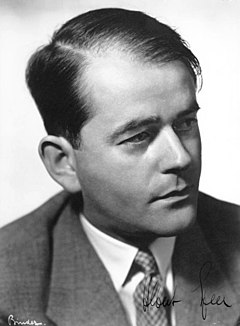Albert Speer
![]()
The title of this article is ambiguous. For other meanings, see Albert Speer (disambiguation).
Berthold Konrad Hermann Albert Speer (born 19 March 1905 in Mannheim; † 1 September 1981 in London) was a German architect and authoritative on architecture under National Socialism. He was also an armaments organizer during the Nazi era and Reich Minister of Armaments and Munitions from 1942. He was sentenced to 20 years in prison as a war criminal at the Nuremberg trial.
Speer's ambition led to an extraordinary career from 1933 onwards. Later, he rose to become Hitler's favorite - especially as an architect - whose proximity he sought specifically and as often as possible. From 1937 onwards he was general building inspector for the Reich capital, planned the new construction of Berlin and directed numerous monumental building projects of Hitler, including the construction of the New Reich Chancellery, which were to underline the NS claim to rule. When Fritz Todt died in a plane crash on February 8, 1942, Speer succeeded him as armaments minister. He succeeded in continuing to increase total production annually until the end of the war, despite heavy bombing. In this way he contributed decisively to the prolongation of German warfare, which led to the greatest number of casualties in the last year of the war. As armaments minister, he was jointly responsible for the employment of seven million forced laborers, including some 450,000 concentration camp prisoners, and exerted influence on the operation and expansion of concentration camps. Speer was among the 24 defendants in the Nuremberg trial of major war criminals before the International Military Tribunal, but it was unaware of important parts of Speer's activities. In 1946 he was found guilty of war crimes and crimes against humanity and sentenced to 20 years in prison. He served all of this time in the Spandau War Crimes Prison.
Particularly because of his highly embellished autobiographical writings published after his imprisonment and the justification they contain for his worldview, his participation in the construction of concentration and mass extermination camps, as one of the main perpetrators of National Socialist war crimes, and because of his enrichment from Jewish distress sales ("Aryanization"), Speer is generally not considered trustworthy as a contemporary witness.

Albert Speer (1933)
Writings
- Memoirs. Ullstein, Berlin 1969, ISBN 3-549-07184-1. (Number 1 on the Spiegel bestseller list in 1969 and 1970).
- Spandau Diaries. Propyläen, Berlin et al. 1975, ISBN 978-3-549-17316-9. (Number 1 on the Spiegel bestseller list from September 15, 1975 to February 15, 1976) Many other editions.
- The Slave State. My confrontation with the SS. Ullstein, Berlin 1981, ISBN 978-3-421-06059-4. (Many other editions).
- The Kransberg Protocols 1945. His First Statements and Records, June - September. Edited by Ulrich Schlie. F. A. Herbig, Munich 2003, ISBN 3-7766-2288-1.
Film and radio
- Heinrich Breloer (writer and director): Speer und Er. Docudrama. Germany, 2004.
- Artem Demenok (writer and director): World Capital Germania. Documentary. Germany, 2005.
- Annette von der Heyde: Albert Speer and the Dream of Hollywood. Documentary. Germany, 2021. (Channel link. Length: 44 min. On the American television series Inside the Third Reich, 1982, based on a biography of Speer by E. Jack Neuman, screenplay; Marvin J. Chomsky, director).
- Reinhard Knodt: Speer and Us. Radio documentary, Bayerischer Rundfunk. Germany, 2005.
- Marcel Ophüls - The Memory of Justice (Engl.: Not Guilty? documentary film from 1976, in which Speer has his say over long stretches).
- Nigel Paterson (Director): Nuremberg - The Trials - Albert Speer - Career Without Conscience. Great Britain, 2006, 59 min. German version BR. (Docu-drama combining eyewitness accounts and archive footage with re-enacted scenes).
- Secrets of the "Third Reich". 6th, Speer's Deception. ZDF, Documentary. Germany, 2011.
- 2015: Speer, Architecture and/ or Power, theatrical monologue of "Gli Eredi", with Ettore Nicoletti, text by Kristian Fabbri. The text was awarded the "Autori Italiani - 2015" prize in the Monologues section by the Carlo Terron Theatre Foundation.
- Stephan Krass: The Spearman. Radio play with Matthias Brandt and Caroline Junghanns. Südwestdeutscher Rundfunk (SWR). Germany, 2015.
- Vanessa Lapa: Speer Goes to Hollywood. Documentary. Israel, 2020. (Documentary based on audio recordings of Speer's collaboration with screenwriter Andrew Birkin on a biographical film that was ultimately never realized).
Search within the encyclopedia